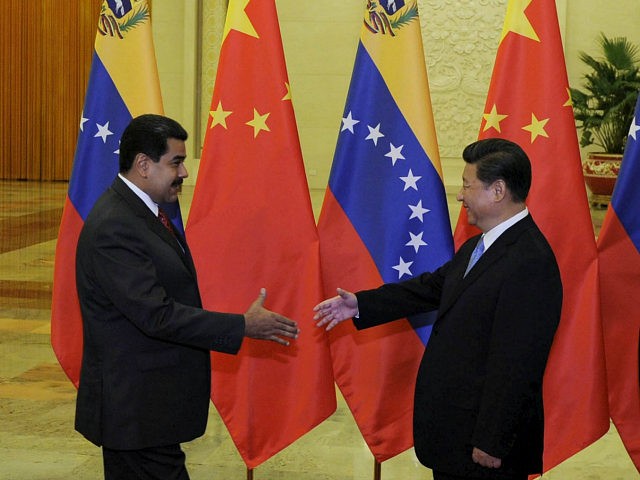China’s Foreign Ministry accused America of having “sour grapes” over its cozy relationship with the illegitimate socialist regime of dictator Nicolás Maduro in Venezuela on Tuesday, responding to U.S. military concerns that Beijing in indebting the Latin American country into a bigger crisis.
Foreign Ministry spokesman Geng Shuang was responding to a reporter’s question regarding comments made last week by Admiral Craig Faller, the head of U.S. Southern Command (SOUTHCOM), warning that China is a destabilizing influence in the region, nowhere more so than Venezuela.
“Officials from the US have been smearing China’s cooperation with Venezuela and Latin America, but their words just do not hold water,” Geng told the unnamed reporter. “As you all know, China’s cooperation with Venezuela and Latin America follows the principle of mutual respect, equality and win-win cooperation. It focuses on common development.”
Geng claimed that China has “brought tangible benefits” to both Venezuela and China through its support for Maduro, whose presidential term legally ended in January, and that Washington merely laments that it cannot impose a “New Monroe Doctrine” on the region.
The Monroe Doctrine, named after President James Monroe, was an American policy that stated Washington would respond with hostility to any attempts by European nations to colonize more territory in the Western Hemisphere. Some have interpreted a modern version of that doctrine to include colonialist moves by countries outside of both the Western Hemisphere and Europe, like China and Russia.
“The US groundless accusations are nothing but sour grapes. … If the US really cares for Latin America’s development, it should take concrete measures to help Latin American countries in their economy and people’s livelihood,” Geng added.
The spokesman concluded with a subtle invite to the United States to also take predatory loans from China like the ones Beijing is accused of signing off to Venezuela.
“China is open to cooperation between Latin America and other countries, including the US. We hope the US can be just as broad-minded as China is,” he said.
Speaking to the Senate Armed Service Committee last week, Admiral Faller warned that China’s – and Russia’s – expansion of influence in Latin America was “the most disturbing insight” he would bring to lawmakers that day.
“China is now inside our own neighborhood seeking to displace the United States as the partner of choice and weaken the commitment of our partners to the rule of law and democracy,” Faller warned. “It is the single largest creditor of the Maduro regime, saddling the Venezuelan people with more than $60 billion in debt and providing financial lifelines that have helped keep Maduro in power.”
“Enormous sums of Chinese cash, coupled with murky conditions on loans and business deals, have the potential to exacerbate the region’s corruption problem,” he also suggested. Faller also condemned China for selling weapons of repression and surveillance equipment to Maduro, used to imprison, torture, kill, and monitor anti-socialist dissidents.
Maduro is facing a prolonged struggle for power against the nation’s legitimate president, Juan Guaidó, who took office in January as an interim head of government in light of Maduro’s refusal to step down. Guaidó has a temporary mandate to organize free and fair elections for his replacement but has failed to take control of the country as Maduro refuses to vacate the presidential palace and still control’s the nation’s military. An attempt to overthrow Maduro’s military leaders in April failed, stagnating Guaidó’s efforts.
China has used the time that Maduro bought following the failed April uprising to shore up the socialist regime’s coffers. According to Reuters, Venezuela’s oil exports – sanctioned by the U.S government – experienced a 26 percent increase from May to June, largely thanks to Chinese purchases. China bought 59 percent of the oil Venezuela sold in June. by far the top purchaser.
In September, Maduro announced that he had secured a $5 billion loan from China that he agreed to pay back in oil shipments.
Maduro has also allowed Chinese companies to take root in Venezuela, at great profit to Beijing but little benefit to the Venezuelan people. Among the most egregious known examples of this is the CAMC engineering company, a Chinese firm late dictator Hugo Chávez hired in 2010 to build up the infrastructure in Delta Amacuro, a far-flung state with minimal development. By 2019, according to Reuters, CAMC had made billions, but “locals are hungry,” and no evidence existed of the development promised in the region.
China has taken on a prominent role in Maduro regime propaganda. In June, China’s ambassador to Caracas, Li Baorong, has attended public ceremonies celebrating the 45th anniversary of bilateral ties, including an homage to Venezuelan founding father Simón Bolívar. Venezuela’s state media also promotes China’s “Confucius Institutes,” academic organizations China uses to advance the Communist Party’s Han supremacist agenda abroad. According to Venezuela’s state broadcaster VTV, the Confucius Institute of Venezuela has enrolled 3,600 Venezuelan students in Mandarin language classes and plans to host Chinese poetry, music, and theater events in a country facing severe food and medicine shortages.

COMMENTS
Please let us know if you're having issues with commenting.